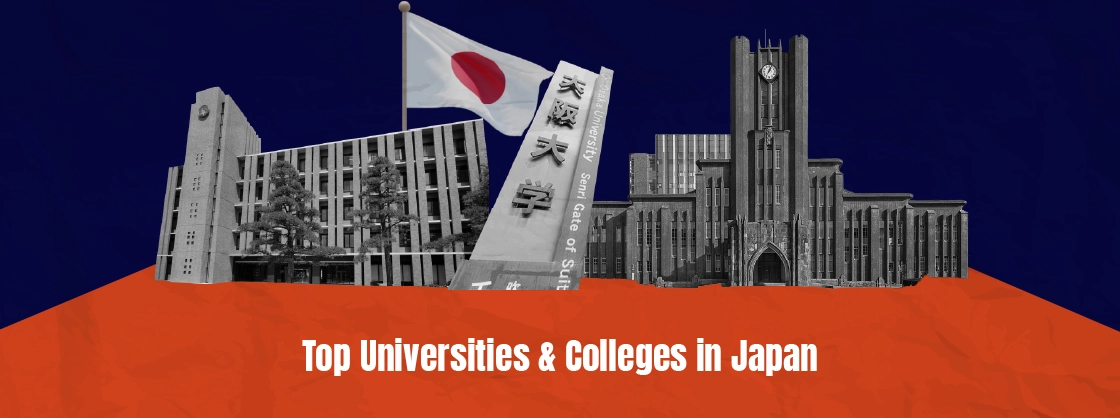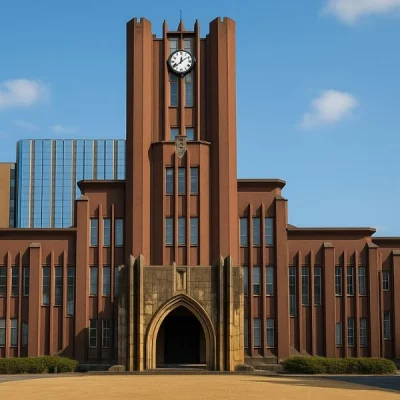List of Top Universities & Colleges in Japan | 2025
Table of Contents
Japan is home to 50+ top universities, including four which rank in the top 100 worldwide. Japan is your ideal destination where tradition seamlessly blends with innovation, creating an unparalleled environment for education. The country is home to some of the world’s top universities and colleges. Renowned for its cutting-edge research and academic excellence, including the one in Tokyo and Kyoto.
Whether you’re drawn to advanced technology, cultural studies, or business management, Japan’s educational landscape promises a transformative experience. Dive into our curated list of Japan’s leading universities and discover the perfect destination to shape your academic future.
Top 10 Universities in Japan in 2024-25
Here’s a table highlighting the top 10 universities in Japan in 2024-25.
| University | National Rank | City |
| Tohoku University | #1 | Sendai |
| The University of Tokyo | #2 | Tokyo |
| Osaka University | #3 | Osaka |
| Tokyo Institute of Technology | #4 | Tokyo |
| Kyoto University | #5 | Kyoto |
| Kyushu University | #6 | Fukuoka |
| Hokkaido University | #7 | Hokkaido |
| Nagoya University | #8 | Aichi |
| University of Tsukuba | #9 | Ibaraki |
| International Christian University | #10 | Tokyo |
Tohoku University
Tohoku University, based in Sendai, Japan, ranks 120th globally in the Times Higher Education World University Rankings 2025. Tohoku is best known for its robust research and innovation and spans four campuses across Sendai: Katahira, Kawauchi, Aobayama, and Seiryo Campus. A pioneer in inclusivity, it was the first Japanese university to admit women and graduates of technical schools. Tohoku University excels in engineering, ranked 59th worldwide, and has been designated a National University by the Japanese government for its academic achievements.
University of Tokyo
The University of Tokyo is one of the most prestigious institutions of higher education in the world. It is ranked #32 in the QS World University List 2025 and among other education analysts as well. The main campus is Hongo and is the largest of all. Tokyo is known for its excellence in science, engineering, and humanities. Popular courses include law, economics, and engineering. With a strong focus on research, the university consistently ranks among the world’s top 30 institutions. It boasts a global reputation for fostering innovation and academic rigor.
Osaka University
Founded in 1931, Osaka University originated as Osaka Imperial University, stemming from the Osaka Prefecture Medical School. Initially offering two schools, it expanded to include additional disciplines over the years. Today, the university comprises 11 undergraduate schools, 16 graduate schools, and several specialized research institutes. It operates across four campuses—Suita, Toyonaka, Minoh, and Nakanoshima—and is home to over 25,000 students, including 2,000 international students. As Japan’s largest national university, it offers a diverse range of programs, including international public policy and frontier biosciences. It is recognized for fostering academic excellence and research.
Tokyo Institute of Technology
Tokyo Institute of Technology, or Tokyo Tech, was a public university in Meguro, Tokyo. On 1 October 2024, Tokyo Tech was merged with Tokyo Medical and Dental University and formed the Institute of Science Tokyo.
The Tokyo Institute of Technology, a Designated National University and a part of Japan’s Top Global University Project, has its main campus in Ōokayama, with additional campuses in Suzukakedai and Tamachi. Organized into six schools, Tokyo Tech offers over 40 departments and research centers. For the 2015-2016 academic year, it enrolled approximately 4,734 undergraduates and 1,464 graduate students. The university is renowned for its research and innovation in science and technology.
Kyoto University
Kyoto University is one of the top universities in the world and is globally ranked #55. Kyoto was established in 1897 as Kyoto Imperial University on the island of Honshu and is the second oldest university in Japan. It is Japan’s one of the “National Seven.”
Kyoto University began with faculties in law, medicine, letters, and science and engineering, and soon expanded to include economics, agriculture, and humanities, alongside establishing its first graduate school. Today, the university comprises 10 faculties, 18 graduate schools, and 14 research institutes, making it the Japanese university with the most research institutes. Its three campuses—Yoshida, Uji, and Katsura—are located in a city steeped in culture and history. Kyoto’s rich environment, combined with the university’s research excellence, attracts about 23,000 students, including 2,000 international students. The university has produced nine Nobel laureates and two Fields Medalists.
Conclusion
This was all about the best universities in Japan for international students. If you are planning to study in Japan, then this guide can help you select the right university and make the best of your academic journey in the beautiful islands of Japan.
Frequently Asked Questions
Which is the best university in Japan for international students?
Some of the best universities in Japan include Tohoku University, the University of Tokyo, Osaka University, Tokyo Tech, etc.
How are colleges in Japan for international students?
Japanese universities are increasingly international student-friendly, with many offering programs in English, cultural exchange opportunities, and dedicated support for international students. Prestigious institutions like the University of Tokyo and Kyoto University welcome thousands of international students annually, offering robust international networks, excellent research facilities, and competitive academic programs. These universities also provide language courses to help students integrate into Japanese society.
Which test is required to study in Japan?
To study in Japan, international students generally need to pass the Japanese Language Proficiency Test (JLPT) for non-English programs. For English-taught programs, standardized tests like TOEFL or IELTS are often required. Some universities may also require the Examination for Japanese University Admission for International Students (EJU).
What are the types of student accommodation in Tokyo?
Student accommodation in Tokyo includes university dorms/ halls, private apartments, student housing, and homestays. Each of these student accommodations are equipped with essential housing features and offer an academic-friendly environment.
Are dormitory for international students in Japan available?
Yes. Universities in Japan offer dormitory for domestic and international students, especially for undergraduate students. Students can visit their university websites and book a dorm in advance.
Are there student share houses in Tokyo?
Students in Japana can live in shared houses or rooms. Multiple online student accommodation platforms offer reliable shared housing options in Japan for international students. Additionally, these properties offer a budget-friendly living option for students.





